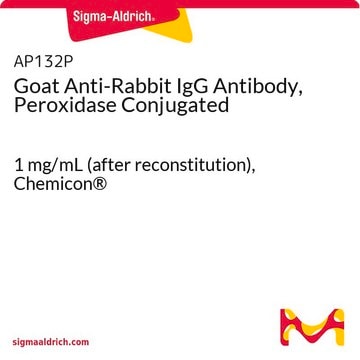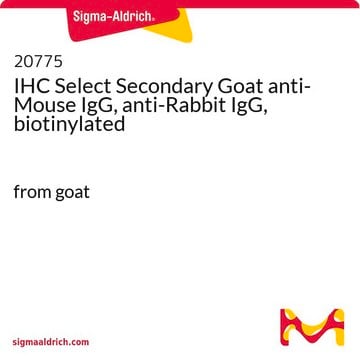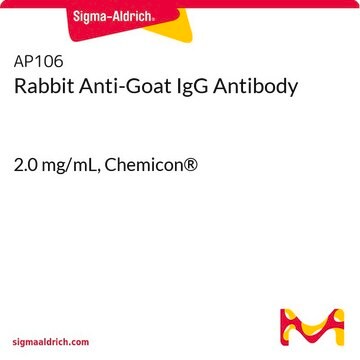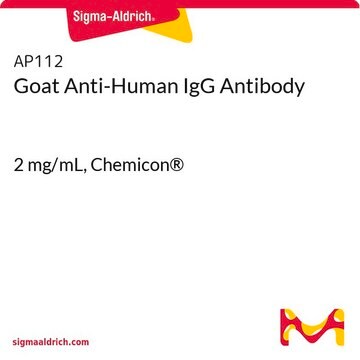AP132-M
Goat Anti-Rabbit IgG Antibody
2 mg/mL, Chemicon®
Se connecterpour consulter vos tarifs contractuels et ceux de votre entreprise/organisme
About This Item
Code UNSPSC :
12352203
eCl@ss :
32160702
Produits recommandés
Source biologique
goat
Niveau de qualité
Conjugué
unconjugated
Forme d'anticorps
affinity purified immunoglobulin
Clone
polyclonal
Espèces réactives
rabbit
Fabricant/nom de marque
Chemicon®
Concentration
2 mg/mL
Technique(s)
ELISA: suitable
immunofluorescence: suitable
western blot: suitable
Conditions d'expédition
wet ice
Description générale
Immunoglobulin G (IgG), is one of the most abundant proteins in human serum with normal levels between 8-17 mg/mL in adult blood. IgG is important for our defence against microorganisms and the molecules are produced by B lymphocytes as a part of our adaptive immune response. The IgG molecule has two separate functions; to bind to the pathogen that elicited the response and to recruit other cells and molecules to destroy the antigen. The variability of the IgG pool is generated by somatic recombination and the number of specificities in an individual at a given time point is estimated to be 1011 variants.
Spécificité
Reacts with Rabbit IgG gamma chain, as well as the light chains from all Rabbit immunoglobulin classes. Monospecific on IEP against whole Rabbit Serum.
Immunogène
Highly purified Rabbit IgG isolated from pooled normal Rabbit Serum.
Application
Goat anti-Rabbit IgG Antibody is an antibody against Rabbit IgG for use in ELISA, IP & WB.
Research Category
Secondary & Control Antibodies
Secondary & Control Antibodies
Research Sub Category
Whole Immunoglobulin Secondary Antibodies
Whole Immunoglobulin Secondary Antibodies
Stockage et stabilité
Store at +2-8°C.
Informations légales
CHEMICON is a registered trademark of Merck KGaA, Darmstadt, Germany
Clause de non-responsabilité
Unless otherwise stated in our catalog or other company documentation accompanying the product(s), our products are intended for research use only and are not to be used for any other purpose, which includes but is not limited to, unauthorized commercial uses, in vitro diagnostic uses, ex vivo or in vivo therapeutic uses or any type of consumption or application to humans or animals.
Certificats d'analyse (COA)
Recherchez un Certificats d'analyse (COA) en saisissant le numéro de lot du produit. Les numéros de lot figurent sur l'étiquette du produit après les mots "Lot" ou "Batch".
Déjà en possession de ce produit ?
Retrouvez la documentation relative aux produits que vous avez récemment achetés dans la Bibliothèque de documents.
Les clients ont également consulté
The promotion of human mesenchymal stem cell proliferation by superparamagnetic iron oxide nanoparticles.
Dong-Ming Huang,Jong-Kai Hsiao,Ying-Chun Chen,Li-Ying Chien,Ming Yao,Yin-Kai Chen et al.
Biomaterials null
Effect of body condition score of the dairy cow on the in vitro immune response of peripheral blood mononuclear cells to progesterone stimulation.
Ohtsuka H, Murase Y, Ando T, Kohiruimaki M, Mukai M, Oikawa M, Petrovski KR, Morris S
The Journal of Veterinary Medical Science null
Iron oxide nanoparticle-induced epidermal growth factor receptor expression in human stem cells for tumor therapy.
Tsai-Hua Chung,Jong-Kai Hsiao,Szu-Chun Hsu,Ming Yao,Yao-Chang Chen,Shih-Wei Wang et al.
ACS Nano null
J V Joseph et al.
Cell death & disease, 5, e1443-e1443 (2014-10-03)
Different molecular subtypes of glioblastoma (GBM) have been recently identified, of which the mesenchymal subtype is associated with worst prognoses. Here, we report that transforming growth factor-β (TGF-β) is able to induce a mesenchymal phenotype in GBM that involves activation
Mihai G Mehedint et al.
FASEB journal : official publication of the Federation of American Societies for Experimental Biology, 24(1), 184-195 (2009-09-16)
Maternal choline availability is essential for fetal neurogenesis. Choline deprivation (CD) causes hypomethylation of specific CpG islands in genes controlling cell cycling in fetal hippocampus. We now report that, in C57BL/6 mice, CD during gestational days 12-17 also altered methylation
Notre équipe de scientifiques dispose d'une expérience dans tous les secteurs de la recherche, notamment en sciences de la vie, science des matériaux, synthèse chimique, chromatographie, analyse et dans de nombreux autres domaines..
Contacter notre Service technique













